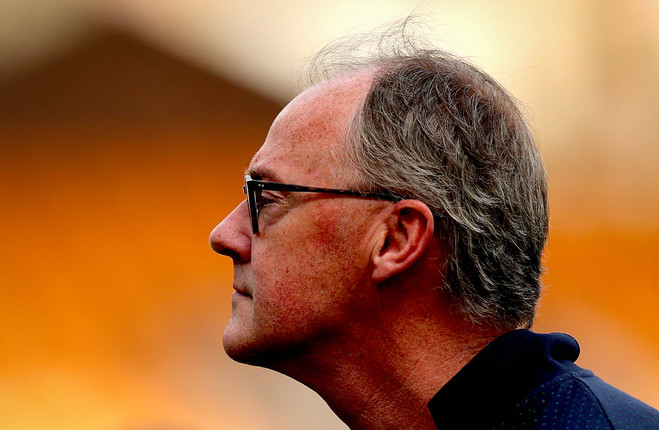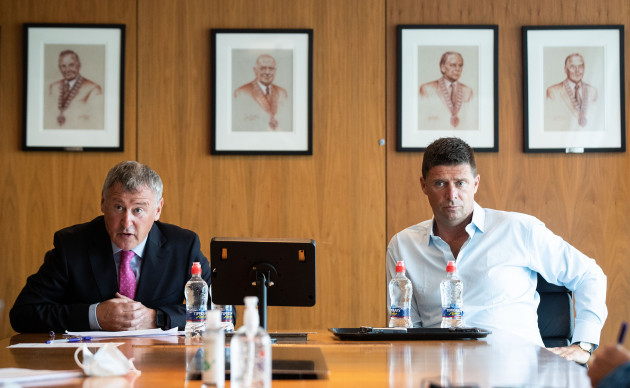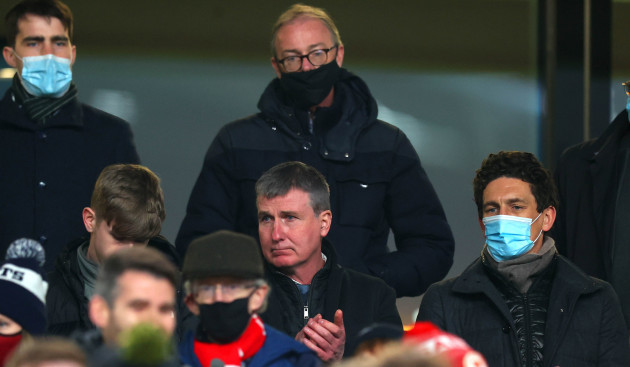THE EMAIL INBOXES of the FAI’s elected delegates pinged at 6.11pm on Wednesday.
A minute later, the same message came through to the inboxes of the journalists on the FAI’s mailing list: the news wasn’t going to stay among the FAI’s members for much longer than one minute, as Roy Barrett was stepping down as the Chairperson of the FAI.
Barrett is leaving primarily to facilitate the appointment of a female chairperson to help the FAI meet a gender quota of 40%, which he agreed the FAI would meet by the end of this year in his first major act in the role.
“There has been an awful lot of good work been done and I am happy the organisation is in a good place”, said Barrett yesterday. “I don’t believe the people in my type of role should stay for a long time. I do believe in either boards or organisations regenerating themselves.”
Barrett took the job at the start of 2020, becoming the FAI’s first ever independent chairperson in the process. His role was created as part of a number of governance reforms the FAI agreed to undertake once the flimsy house that John Delaney built had come crashing so chaotically down.
Barrett was initially a surprising choice for the role. While he has an impressive professional track record away from football – serving as Managing Director of Goodbody Stockbrokers for 24 years – he had kept a reasonably low profile to that point and had little obvious involvement in football .
Barrett captained the football team at the rugby-proud Blackrock College, however, where he was a classmate of Shelbourne chairman Andrew Doyle – with whom he jousted during his time at the FAI – and Paul Rowan, the Sunday Times journalist who did more than most to expose the follies of Delaney’s regime.
The circumstances of Barrett’s appointment to the FAI became a cause for controversy. It emerged that he did not apply for the job and did not appear on an external recruitment firm’s shortlist for the role. It then transpired that Barrett was recommended for the role by the CEO of the Bank of Ireland, who were the FAI’s biggest creditor, and was then asked to do the role. Barrett dismissed claims this led to a conflict of interest as “nonsense.”
His first major task in 2020 was to sign a Memorandum of Understanding with then-Sports Minister Shane Ross that guaranteed a strings-attached State bailout of the FAI.
That deal with the government prevented the FAI from going bankrupt and the credibility which Barrett brought to financial matters proved important in stabilising the FAI after the convulsions of 2019. Barrett himself was a stable figure, with one former staffer describing him to The42 as “the calmest man in every room.”
He is understood to have made a good first impression with the staff of the FAI, whose morale had sunk to an all-time low amid the slew of negative headlines and worrying stories after Delaney’s exit. The bar for leadership at Abbottstown at the time was admittedly very low, but Barrett’s decision to arrive minutes before his first face-to-face meeting with staff to explain why he would be 10 minutes late went down well, as staff felt they were finally being given a little respect.
That same respect was extended to the member of staff who was left behind in Bratislava in 2020, after a false positive test for Covid left the staffer isolated in the team hotel and caused Aaron Connolly and Adam Idah to needlessly miss the Euro 2020 playoff with Slovakia.
Barrett rang the member of staff after they returned to Ireland, listened on the phone to a venting of frustrations at the staffer’s feeling neglected as the story unfolded in Slovakia, and then told him the FAI had let him down. The staffer later told The42 that he was grateful for the call and the fact Barrett was the first senior FAI figure who made him feel he had been listened to. (By contrast, a member of the travelling party had phoned him when he was isolating in the Bratislava hotel to enquire about his wellbeing and ask whether he could bring home a pair of shoes they had forgotten in the hotel.)
Barrett did not enjoy the same rapport with all of the elected figures representing some of the different constituencies in Irish football.
The ratification of a key term of the MOU – that the FAI board be reconstituted to six directors elected from the FAI’s membership and six external, independent directors – descended to a circus later in 2020, with the eight, self-styled elected directors breaking from Barrett and the other independent directors by issuing a public statement rebuking then CEO Gary Owens over claims the board approved the terms of the MOU before it was signed.
Owens and Barrett were both members of a so-called Visionary Group who published proposals for a total overhaul of Irish football in May 2019, along with Niall Quinn. That Owens arrived as interim CEO a fortnight after Barrett’s appointment and Quinn as his deputy three days later led to some of the FAI’s rank-and-file claim the Association was prey to a takeover.
Ultimately the FAI’s members agreed to the six/six split after a rancorous meeting at the Red Cow Hotel after which the president Gerry McAnaney said unity had been restored and “apologies had been made” over the public criticism of the CEO. Owens, however, did not apply for the CEO role on a permanent basis later in the year, and Quinn left days later.
Barrett hated factionalism and took the unusual step – following board approval – of writing to delegates to warn against the “objectionable” prospect of bloc voting on the eve of the presidential elections, after which McAnaney was re-elected to the position. He also last year wrote to board members to vent his annoyance at leaks casting doubt over Stephen Kenny’s position. The letter was quickly leaked to the Sunday Times.
Fractures between the FAI’s various constituencies remain, however. Some elected members of the General Assembly privately complain of a “disconnect” between the FAI hierarchy and the grassroots of the game, believing it has manifested in the relatively poor attendance at last summer’s AGM. (Last month’s disastrous online AGM – abandoned after the voting system didn’t work – was held virtually over worries the meeting would meet a quorum.)
Barrett’s era as Chairperson has also failed to rein in the Schoolboys Association (SFAI) notoriously independent streak. Last year, they forced the FAI into accepting a later start date for last year’s national U14 league, demanded so as to preserve the SFAI’s flagship Kennedy Cup competition.
Furthermore, that the FAI recently permitted the SFAI to propose Tom Browne for election to the FAI board without a meeting among all of their General Assembly delegates has caused bewilderment among the game’s other constituencies, particularly among the professional game, whose delegates met and put forward Niamh O’Mahony, doing so partly in the spirit of addressing the board’s gender balance issue. Barrett’s successor will need to get a handle on these issues.
Football-wise, Barrett has been a vocal supporter of Stephen Kenny, using a press engagement after the disastrous defeat to Luxembourg at the start of 2021 to not only back him in the short-term but introduce the possibility of a contract extension, which has since been granted. He has been supportive of Kenny’s more progressive style of play and his blooding of young players, and though he has backed Kenny behind the scenes, his support didn’t extend to, as one source described it, “following him over a cliff.”
Barrett’s exit at some point this year is unlikely to weaken Kenny in the short-term, given that, barring a truly awful run of results – which is a difficult trend to establish in a qualifying group featuring France and Netherlands – the FAI will honour the contract to the end of the Euro 2024 campaign.
Barrett has also been a strong public backer of CEO Jonathan Hill, who was appointed to the role in 2020 ahead of former Swim Ireland CEO Sarah Keane. Hill’s commercial expertise was crucial in earning the role but he has thus far failed to secure a primary sponsor for the senior men’s international team. Barrett yesterday insisted that this is “not a big issue”, while he has previously described Hill’s decision not to relocate to Ireland as a “non-issue.”
The FAI will miss Barrett’s remarkable ability to publicly defuse a crisis, with which the Association seem to be hit with at a much greater rate than any other sporting organisation in the country. It was Barrett, rather than Hill or McAnaney, who answered the bulk of the media’s questions whenever these eruptions coincided with a press conference.
He will remain in situ until a replacement is appointed, which could take the rest of this year.
Ultimately, Barrett failed to stitch together all of the many divisions among the different constituencies of Irish football, which will continue to erupt and stymie the FAI into the future. But he will be best-remembered as a steady figure who helped to stabilise the FAI at a time of unprecedented chaos.
His successor will have to display the same credibility around financial husbandry while also attracting significant investment. Barrett used a valedictory press conference yesterday to accentuate the sport’s need for more investment, arriving armed with the figures claiming football has been underfunded in comparison to GAA and rugby since 2000.
“The facilities are grossly inadequate for where we are and where we are going”, he said, before again arguing for a cut of the national betting tax that is still ringfenced for horse and greyhound racing. Two percent of every bet made in Ireland goes to those two industries, regardless of the sport on which the bet is wagered. Barrett put the value of it at €1.5 billion.
“I just cannot get my head around that”, he said, calling for the levy to be increased to 3%.
His successor will have to get their head around the day-to-day realities of an organisation still deeply inhibited by the legacies of a crisis Barrett agreed to confront.




